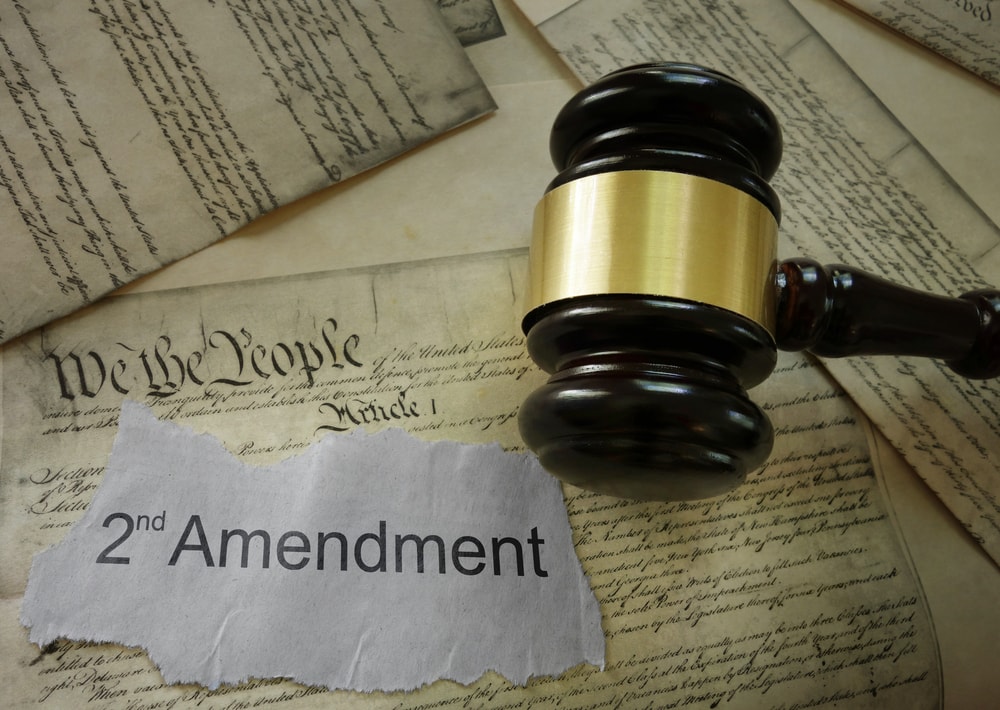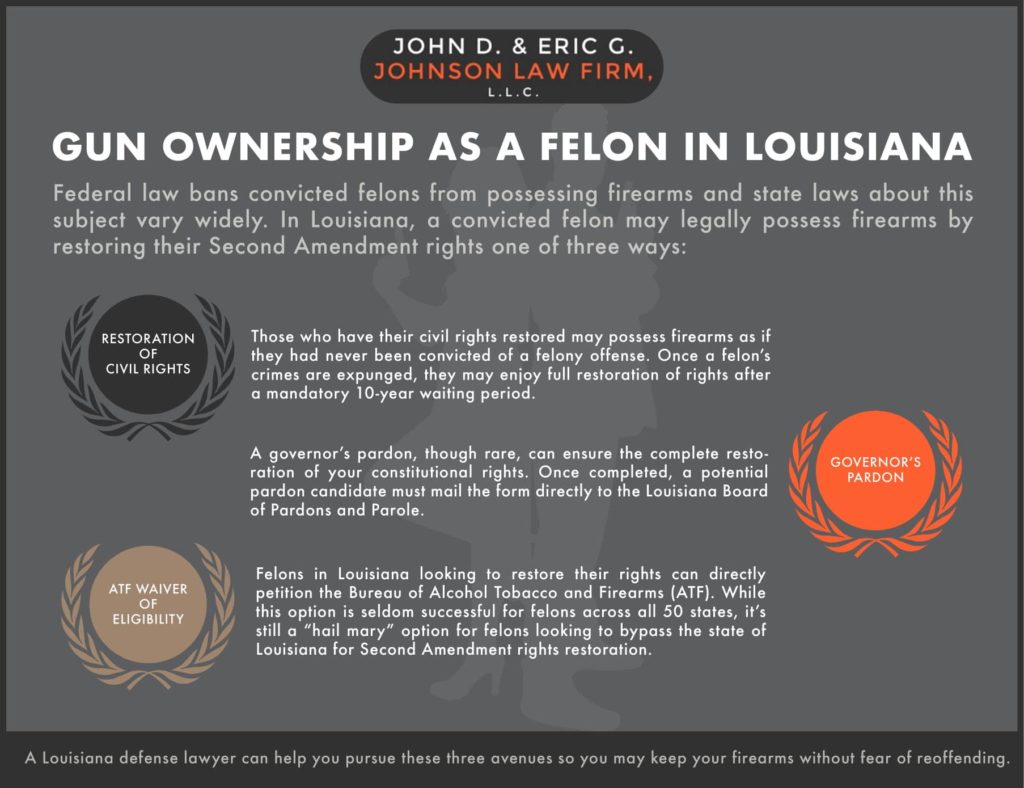

Under the United States Constitution, citizens have the right to bear arms per the Second Amendment. However, most state laws, as well as federal law, prohibit convicted felons from possessing firearms or ammunition. An ex-felon in possession of a firearm in Louisiana can face severe penalties unless he or she is capable of having his or her rights to own those firearms restored.
If you’re wondering how a felony conviction can affect your Second Amendment Rights, it’s important to understand some of the laws that have been passed in the past several decades to limit gun rights in the United States.
The Gun Control Act of 1968
The Gun Control Act of 1968 was a landmark piece of legislation as far as its effects on felons. It marked the first time the United States government would legislate rights for felons.
Under this law, felons were prohibited from owning or possessing firearms or ammunition. Also, while it was assumed proper protocol would be followed by lawful gun salespersons, the law could not restrict private point-of-sale transactions to felons.
The Lautenberg Amendment
While the 1996 Lautenberg Amendment is more or less an “add-on” piece of legislation, it did result in a few significant consequences for felons and non-felons alike in regard to possession of firearms and ammunition.
While injunctions and protective orders are not necessarily criminal in nature, the Lautenberg Amendment opened the door for these civil injunctions to concurrently serve as prohibitions on firearm or ammunition possession.
Also, regardless of whether or not an offender is convicted of a felony or misdemeanor, any convictions related to domestic violence automatically disqualify offenders from owning firearms or ammunition.
Federal Felon Firearm Laws Versus Louisiana Law
A felony conviction in Louisiana is not a “death sentence” for your firearm ownership rights.
There are two particular options for felons looking to restore their right to bear arms in the state of Louisiana:
- Instant restoration: In very rare instances, instant restoration of firearm ownership occurs following the completion of a felony sentence.
- Restoration after ten years: If 10 years have passed, many Louisiana felons can reclaim their firearm ownership rights after their record is expunged.
Aside from these two options, there are also alternative solutions to reclaim your Louisiana firearm ownership rights as a felon. However, they often carry a low probability of success. These options include:
Civil Rights Restoration
Under Louisiana state law, any felonious conviction that was expunged or pardoned shall not be considered a conviction. In this circumstance, the federal court would delegate the final say to the local jurisdiction. In the case of Louisiana, no such expungement exists, and formalized “restoration” of civil rights regarding gun ownership is also absent. Due to the necessity of expungement in the eyes of the federal lawmakers, this paradox posed issues for a considerable amount of time until 2016 amendments to Louisiana law were finalized.
ATF Felony Firearm Waivers
The Bureau of Alcohol, Tobacco, and Firearms (ATF), which oversees federal firearm enforcement, allows felons to petition the ATF for full restoration of their Second Amendment rights in Louisiana. There are, however, a few obstacles that prevent most of these waivers from ever being approved or examined in considerable depth.
Aside from being able to prove a felon does not pose a threat to the public at large, they must wade through considerable red tape:
- Money issues: Due to a lack of a budget for many of these waivers, many times, the ATF simply sends the waiver back without processing it, thereby rendering any attempts to claim a waiver null and void.
- Inability to expedite the process: The Supreme Court has ruled that felons cannot compel the ATF to expedite the procession of waiver claims.
While the exception does exist, it is among the lower probability options for those looking to reclaim their firearm rights.
Muzzleloader Exceptions
Under federal law, not all “guns” are considered by definition to be “firearms.” Exceptions to this rule include so-called “black powder weapons” or “muzzleloaders.” These antiquated firearms are remnants of centuries past, but they are still used and owned by many gun historians and enthusiasts.
Under federal law, these antiquated firearms are considered “antique firearms,” and many are thereby not banned. The criteria for a weapon to be considered an antique firearm includes:
- Manufactured on or before 1898
- Use black powder or black powder substitute instead of a cartridge or magazine
- Cannot be easily converted to fire cartridges or traditional rimfire ammunition
As long as a weapon meets the aforementioned criteria, a felon may own, possess, or purchase an antique firearm. It should be noted, however, that certain parishes or municipalities in Louisiana still consider many “antique firearms” to be firearms, thereby rendering the antique firearm “loophole” irrelevant.
Governor’s Pardon
A governor’s pardon with full restoration of rights is a common method for many felons. They are granted on a very limited basis, and all appeals must be made directly to the Louisiana Board of Paroles and Pardons. Separate “first-offender” pardons also exist, but gubernatorial pardons are typically reserved for repeat offenders.
If you believe you may be eligible to reclaim your gun rights in Louisiana, contact a Louisiana criminal defense attorney with specific firearms experience.
Understanding the Background Check Process in Louisiana
The background check process is a crucial step in the legal acquisition of firearms in Louisiana, as in the rest of the United States. This procedure is designed to ensure that individuals who are prohibited by law from possessing firearms and ammunition are identified and prevented from making such purchases.
Understanding how background checks work, who conducts them, and what criteria are used to evaluate potential gun owners is essential for anyone looking to understand or navigate the process of legally acquiring a firearm.
The Federal Background Check System
The primary tool for conducting background checks for firearm purchases in the United States is the National Instant Criminal Background Check System, operated by the Federal Bureau of Investigation. When an individual attempts to purchase a firearm from a licensed dealer, the dealer submits the buyer’s information to NICS, which then checks various databases to determine eligibility.
Key Databases and Criteria
NICS reviews several databases, including the National Crime Information Center, the Interstate Identification Index (III), and the NICS Index. These databases contain records of criminal history, restraining orders, warrants, mental health adjudications, and other relevant information that might disqualify an individual from owning a firearm.
The criteria for disqualification include:
- Criminal convictions punishable by imprisonment for a term over one year (typically felonies)
- Fugitives from justice
- Unlawful users or addicts of controlled substances
- Individuals adjudicated as mental defectives or committed to mental institutions
- Illegal aliens or those with nonimmigrant visas
- Dishonorably discharged veterans
- Individuals who have renounced U.S. citizenship
- Persons subject to certain restraining orders
- Convicted of domestic violence, both misdemeanor and felony charges
In Louisiana, the state does not require a background check for private sales of firearms between individuals, which is a significant exception to the dealer requirement. However, individuals are still legally responsible for ensuring they do not knowingly sell or transfer firearms to prohibited persons.
The Process
The background check process begins when a potential gun buyer attempts to purchase a firearm from a licensed firearms dealer. The buyer fills out a Federal Form 4473, which collects personal information and answers questions regarding the aforementioned disqualifications.
The dealer submits the information to NICS electronically or via telephone. In most cases, NICS provides an immediate response: proceed, delay, or deny.
A “proceed” response means the sale can go forward; a “delay” indicates that NICS needs more time to research the buyer’s eligibility (up to three business days); a “deny” means the sale is prohibited based on the information found.
Hiring a Skilled Louisiana Criminal Defense Attorney
If you’ve been convicted of a felony under Louisiana law, you may be eligible to restore your Second Amendment rights. A criminal defense attorney in Louisiana can guide you through the process of reclaiming your rights, and they can even reexamine your case to make the most favorable recommendation.
The John D. & Eric G. Johnson Law Firm is highly experienced as it pertains to criminal defense cases. Our firm is dedicated to defending and upholding the rights of all citizens, regardless of the charges they face. Let us fight on your behalf to reclaim your Second Amendment rights. Contact us here or call us at (318) 377-1555 today.
Frequently Asked Questions About Felons Owning Guns in Louisiana
What are gun laws for felons in Louisiana?
Both Louisiana and federal law prohibit anyone with a felony conviction from possessing firearms or ammunition. An ex-felon in possession of a firearm in Louisiana can face severe penalties unless that individual can get his or her rights to own those firearms restored by the state. If you’ve been convicted of a felony under Louisiana law, you may be eligible to restore your Second Amendment rights.
How do I get my gun rights back after a felony in Louisiana?
If you’re an ex-felon, the only certain way of getting your Second Amendment rights restored is with a governor’s pardon that includes full restoration of your rights. They’re granted on a very limited basis, and all appeals must be made directly to the Louisiana Board of Paroles and Pardons. Gubernatorial pardons are typically reserved for repeat offenders.
Do I have to go through a background check when purchasing a gun in Louisiana?
In Louisiana, anyone looking to purchase a gun must go through a background check, and they will not be allowed to sell to anyone who has a criminal record. However, there are two options for felons looking to restore their right to bear arms in Louisiana. One is instant restoration of firearm ownership, which is rare, and the second is restoration after ten years have passed if their record has been expunged.

